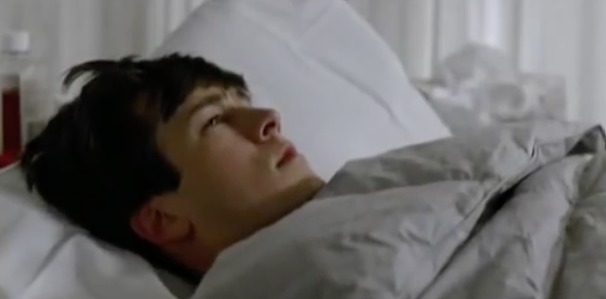But more than 30 years later, Cameron Frye, and his friendship with Ferris, look different through the eyes of today’s teens. They notice different themes and different dynamics. Watching the film from today’s perspective and applying today’s vocabulary, it’s clear that Cameron wasn’t just a sad sack — he was depressed and anxious.
“I’m dying,” he groans in his first scene, cocooned in bed, staring at the ceiling. To which Ferris responds, “You’re not dying. You just can’t think of anything good to do.”
Throughout the film, Cameron’s fear is the foil to Ferris’ free spirit.
When they borrow Cameron’s dad’s precious Ferrari and things go wrong, Cameron “goes berserk,” in Ferris’ words, then spends the next several scenes in a catatonic state.
“Maybe he’s really sick,” Ferris says, nibbling an Oreo in a hot tub while Cameron stares straight ahead over the swimming pool. “Maybe he isn’t just torturing himself.”
Then Cameron tumbles into the pool, fully clothed, and sinks to the bottom. Ferris dives in to save him. It’s an ambiguous move — in the end, a prank, but with hints of suicide.
“Ferris Bueller, you’re my hero,” Cameron says sarcastically.
From Hero to Jerk
When David Singer watched this film in the ’80s, he did think of Ferris as a hero. But that wasn’t his daughter Elliot’s first reaction.
“I kinda hated him,” she says to her dad. “Ferris kinda sucks.”
He orders Cameron to get out of bed and pick him up, forces him to take his dad’s car, then dismisses Cameron’s concerns and blows him off as a worrier.
“He’s a very fun character,” Elliot says of Ferris. “But he’s also kind of an asshole.”
Plus, this whole taking-a-day-off-from-school business, pretending to be sick — that’s not how it goes down in her world. Elliot is a junior at Lick-Wilmerding, a private high school in San Francisco with a reputation for being high pressure.
“People come to school sick because, honestly, at the type of school I’m at, it’s more stressful not to be at school,” she says. “Going and having a fun day is really fun. But it’s also not fun – the amount of stuff you miss in a day.”
Elliot has had her own struggles with anxiety. It makes sense that she would pick up on different themes in the film than her dad and his generation.
